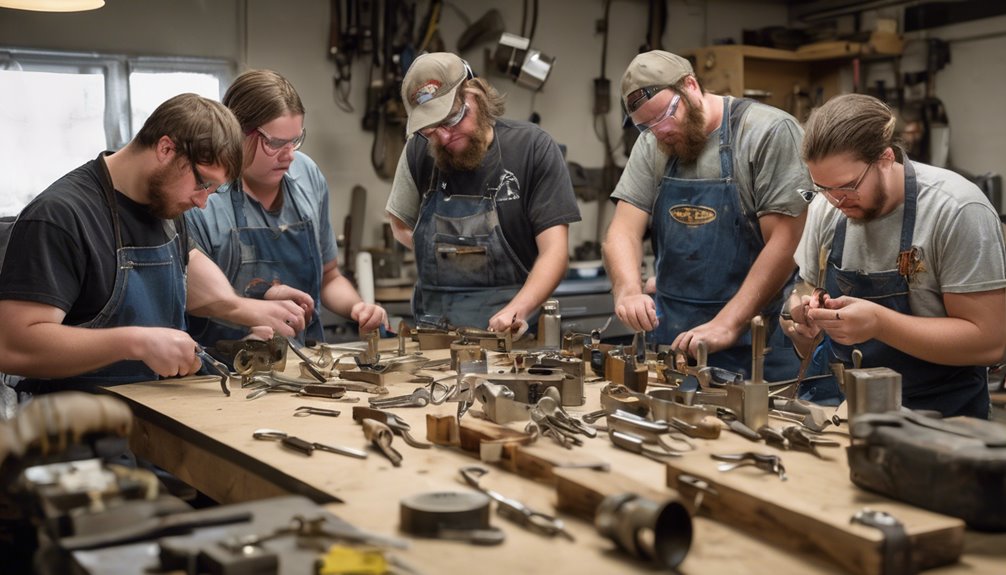If you're considering a career in locksmithing, you're looking at a field that offers both unique challenges and rewarding opportunities. While the path to becoming a locksmith in South Dakota isn't overly complicated, there are key steps and requirements you should be aware of. Understanding what it takes to thrive in this profession can set you apart, especially in a state where practical experience is invaluable. So, what's the first step to accessing your potential?
Key Takeaways
- Meet the minimum age requirement of 18 years and ensure a good moral background for eligibility.
- Gain practical experience through apprenticeships, on-the-job training, or locksmith training courses.
- Obtain a local City Hall business license to legally operate as a locksmith.
- Consider certification from organizations like ALOA to enhance your credibility and skills.
- Stay updated with ongoing education and networking opportunities through organizations like the Associated Locksmiths of America.
Eligibility Requirements for Becoming a Locksmith in South Dakota

To become a locksmith in South Dakota, you need to meet a few basic eligibility requirements.
First, you must be at least 18 years old and have a good moral and ethical background, though a criminal history doesn't automatically disqualify you.
While no formal locksmith training program or specific locksmith licensing is required, gaining practical experience through an apprenticeship or on-the-job training is highly recommended to develop the skills needed for locksmithing.
Additionally, you'll typically need a local City Hall business license to operate legally.
Always check with local departments to confirm current legal requirements before starting your locksmith business.
Steps to Obtain Locksmith Training and Experience
Once you've met the eligibility requirements to become a locksmith in South Dakota, it's time to focus on gaining the necessary training and experience.
Start by enrolling in locksmith training courses at community colleges or locksmith schools. Consider online locksmith training programs for flexible learning, allowing you to study lock mechanisms and key cutting techniques at your own pace.
Joining the Associated Locksmiths of America can provide valuable resources and networking opportunities.
Gaining hands-on experience through an apprenticeship or training under a licensed locksmith is essential for mastering practical exercises in the locksmith industry.
This combination of education and experience will help you work towards locksmith certification, ensuring you're well-prepared for a successful career.
Certifications and Licenses for South Dakota Locksmiths

In South Dakota, while there's no specific locksmith license required, you'll need a general business license to operate legally.
Although formal education isn't mandatory, pursuing certifications can greatly enhance your credibility. Organizations like the Associated Locksmiths of America (ALOA) offer valuable locksmith certification options, including Certified Registered Locksmith (CRL), Certified Professional Locksmith (CPL), and Certified Master Locksmith (CML).
Pursuing certifications from organizations like ALOA can significantly boost your locksmithing credibility and career prospects.
These certifications demonstrate your proficiency in locksmithing skills, making you more attractive to potential employers. Remember, you must be at least 18 years old and maintain a good moral background—having a criminal record doesn't automatically disqualify you.
It's wise to check with local departments or City Hall for specific licensing or business operation requirements in your area.
Starting Your Own Locksmith Business
Starting your own locksmith business can be an exciting and rewarding venture. In South Dakota, you'll need a state-issued business license, but specific locksmith licensing isn't required.
You can choose to operate as a sole proprietorship, partnership, or LLC; an LLC offers better personal asset protection. To succeed, establish a strong online presence with a professional website and effective SEO strategies.
Invest in essential tools like key cutting machines, with initial costs around $1,000. Joining the Associated Locksmiths of America provides valuable resources and networking opportunities.
As you build your locksmith career, prioritize ongoing education and training. By focusing on these elements, you'll set a solid foundation for your locksmith business.
Continuing Education and Professional Development in Locksmithing

Building a successful locksmith business goes beyond just setting it up; ongoing education and professional development play an essential role in ensuring you stay competitive in the field.
You should prioritize continuing education through various avenues, including:
- Joining the Associated Locksmiths of America for resources and networking opportunities.
- Attending workshops to stay updated on security technologies and locksmithing techniques.
- Participating in locksmith training courses and hands-on sessions offered by manufacturers.
- Pursuing advanced certifications like Certified Master Locksmith to enhance your skills and career prospects.
Regularly checking compliance requirements in South Dakota is vital too.
Frequently Asked Questions
Do You Need a Certification to Be a Locksmith?
You don't need a certification to work as a locksmith, but getting one can really boost your job prospects.
While there's no legal requirement, certifications from organizations like the Associated Locksmiths of America can show your skills and commitment to the profession.
Employers often prefer candidates with training and certifications, so investing time in these programs can pay off.
Gaining hands-on experience through apprenticeships also helps you develop essential locksmithing skills.
How Long Does It Take to Learn to Be a Locksmith?
Learning to be a locksmith can feel like a journey of discovery, excitement, and mastery.
You'll find that it usually takes anywhere from a few months to a couple of years, depending on your chosen training path.
Formal programs often last 6 months to 2 years, while apprenticeships can extend from 1 to 3 years.
Online courses offer flexibility, but the key is dedication and hands-on experience to truly excel in the craft.
Do Locksmiths Make Good Money?
Locksmiths can make good money, especially if you gain experience and certifications.
While the national average salary hovers around $47,810, your earnings can vary based on location and skills.
Many locksmiths charge between $18 and $33 per hour, but specializing in services like electronic security or emergency assistance can boost your income.
Operating as a mobile locksmith also increases your earning potential by reaching a wider customer base and accommodating urgent requests.
Is It Worth Training to Be a Locksmith?
Yes, it's worth training to be a locksmith.
You'll gain valuable skills that are in demand, especially with the growing need for security solutions. Training can enhance your job prospects and earning potential, with locksmiths averaging around $47,810 per year.
Plus, certifications can boost your credibility, attracting more clients. If you're considering entrepreneurship, this training opens doors for starting your own business and controlling your income potential.









